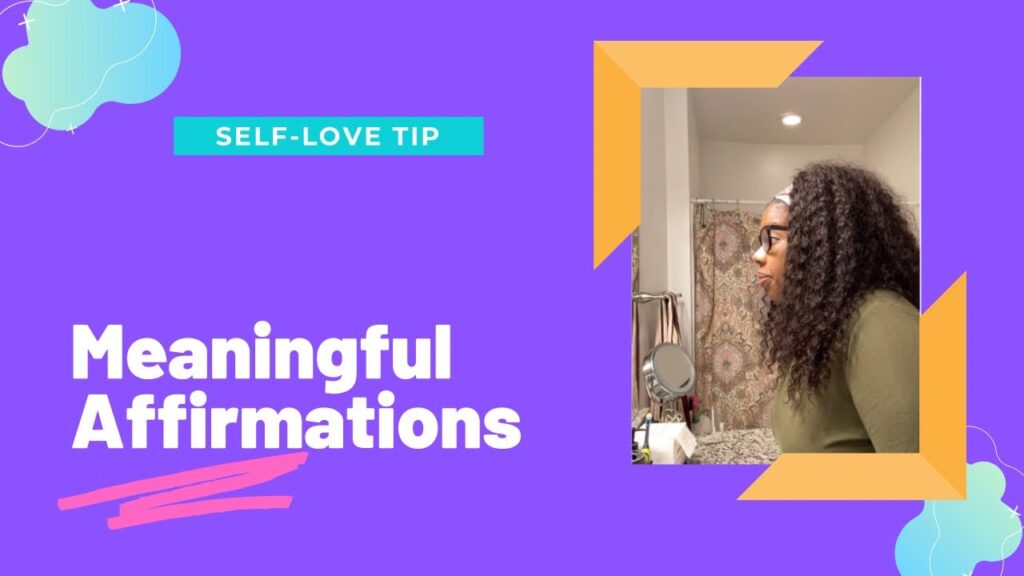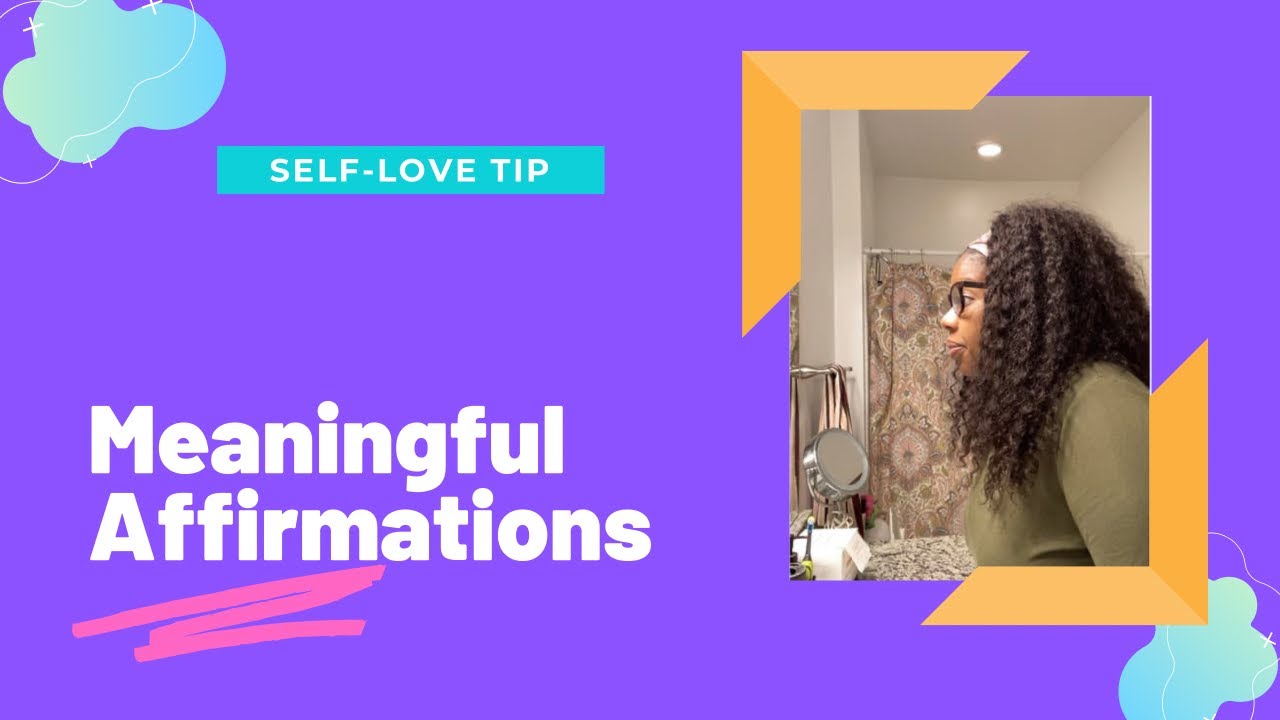
Unlock Your Potential: The Power of Meaningful Affirmations
In today’s fast-paced world, maintaining a positive mindset can feel like an uphill battle. The constant barrage of negativity from news cycles, social media, and daily stressors can easily erode our self-esteem and limit our potential. This is where the practice of using meaningful affirmations comes into play. These are not just empty platitudes; they are carefully crafted statements designed to challenge negative thought patterns and cultivate a more positive and empowered self-image. By consistently repeating meaningful affirmations, we can reprogram our subconscious mind, leading to profound changes in our beliefs, behaviors, and overall well-being.
What are Meaningful Affirmations?
Meaningful affirmations are positive statements that you repeat to yourself regularly. They are designed to help you overcome negative thoughts and beliefs, and to create a more positive and empowering self-image. Unlike simple positive thinking, meaningful affirmations go deeper by focusing on specific areas where you want to see change. They acknowledge the present reality while simultaneously envisioning a desired future state.
The key to making meaningful affirmations truly effective lies in their personal relevance. A generic affirmation like “I am successful” might not resonate with someone struggling with career challenges. However, a more specific and meaningful affirmation such as “I am developing the skills necessary to excel in my field” can be far more impactful.
The Science Behind Affirmations
While the concept of affirmations might seem somewhat esoteric, there’s growing scientific evidence to support their effectiveness. Studies in neuroscience have shown that repeating positive statements can actually alter the neural pathways in our brains. This process, known as neuroplasticity, allows us to rewire our brains and create new, more positive thought patterns. Functional MRI studies have demonstrated that practicing affirmations activates brain regions associated with self-affirmation and reward processing, suggesting that these practices can indeed have a tangible impact on our brain chemistry and cognitive function.
Furthermore, research in psychology has shown that affirmations can help to reduce stress, improve problem-solving abilities, and increase feelings of self-worth. By challenging negative self-talk and promoting a more positive outlook, meaningful affirmations can act as a buffer against the negative effects of stress and adversity.
Creating Your Own Meaningful Affirmations
The most effective meaningful affirmations are those that are tailored to your specific needs and goals. Here’s a step-by-step guide to crafting your own:
Identify Your Limiting Beliefs
Start by identifying the negative thoughts and beliefs that are holding you back. What are the recurring themes in your self-talk? What areas of your life do you feel most insecure or inadequate in? Once you’ve identified these limiting beliefs, you can begin to craft affirmations that directly challenge them.
Frame Your Affirmations Positively
Ensure that your affirmations are phrased in a positive and empowering way. Avoid using negative words like “don’t” or “can’t.” Instead, focus on what you want to achieve and the positive qualities you want to cultivate. For example, instead of saying “I don’t want to be anxious,” try “I am calm and confident in all situations.”
Use the Present Tense
Write your affirmations as if they are already true. This helps to reinforce the belief that your desired outcome is already within reach. Instead of saying “I will be successful,” say “I am successful.” This simple shift in tense can have a profound impact on your subconscious mind.
Make Them Specific and Measurable
The more specific and measurable your affirmations are, the more effective they will be. Instead of saying “I am happy,” try “I am grateful for the joy and abundance in my life.” Adding specific details and examples can make your affirmations feel more real and tangible.
Connect with Your Emotions
The most powerful meaningful affirmations are those that evoke strong positive emotions. When you repeat your affirmations, try to connect with the feelings of joy, gratitude, and excitement that are associated with achieving your desired outcome. This emotional connection will help to reinforce the positive message and make it more likely to take root in your subconscious mind.
Examples of Meaningful Affirmations
Here are some examples of meaningful affirmations that you can adapt and personalize to suit your own needs:
- “I am worthy of love and respect.”
- “I am capable of achieving my goals.”
- “I am strong and resilient in the face of adversity.”
- “I am grateful for all the blessings in my life.”
- “I am confident in my abilities and talents.”
- “I am attracting positive opportunities into my life.”
- “I am healthy, vibrant, and full of energy.”
- “I am creating a life that is filled with joy and purpose.”
- “I am learning and growing every day.”
- “I am surrounded by love and support.”
How to Incorporate Affirmations into Your Daily Routine
Consistency is key when it comes to making meaningful affirmations a part of your life. Here are some tips for incorporating them into your daily routine:
Morning Ritual
Start your day by repeating your affirmations aloud. This can help to set a positive tone for the day and prime your mind for success. Find a quiet place where you can focus and connect with your emotions as you repeat your affirmations.
Throughout the Day
Carry a list of your affirmations with you and review them throughout the day, especially during moments of stress or doubt. You can also set reminders on your phone to prompt you to repeat your affirmations at regular intervals.
Before Bed
End your day by repeating your affirmations before you go to sleep. This can help to reinforce the positive message and allow it to sink into your subconscious mind as you sleep. [See also: The Science of Sleep and Mental Well-being]
Visualization
Combine your affirmations with visualization techniques. As you repeat your affirmations, visualize yourself achieving your desired outcome. See yourself succeeding, feeling happy, and enjoying the fruits of your labor. This can help to make your affirmations more real and tangible.
Journaling
Write your affirmations in a journal and reflect on how they make you feel. This can help you to deepen your connection with your affirmations and track your progress over time. [See also: The Benefits of Journaling for Mental Clarity]
Overcoming Challenges with Affirmations
It’s important to acknowledge that you may encounter resistance when you first start using meaningful affirmations. Your negative thought patterns may try to sabotage your efforts, and you may find yourself doubting the effectiveness of the practice. However, it’s crucial to persevere and stay committed to your affirmations. With consistent effort, you can gradually overcome these challenges and reprogram your subconscious mind.
One common challenge is feeling like your affirmations are not true. If you find yourself struggling to believe your affirmations, try modifying them to make them more believable. For example, instead of saying “I am wealthy,” you could say “I am taking steps to create financial abundance in my life.” This can help to bridge the gap between your current reality and your desired outcome.
The Importance of Self-Compassion
When using meaningful affirmations, it’s essential to practice self-compassion. Be kind and understanding towards yourself, especially during moments of struggle or self-doubt. Remember that it’s okay to make mistakes and that you are worthy of love and acceptance, regardless of your imperfections. Self-compassion can help to create a more supportive and nurturing inner environment, making it easier to cultivate positive beliefs and achieve your goals.
Meaningful affirmations are a powerful tool for personal growth and transformation. By consciously choosing to focus on positive thoughts and beliefs, we can reprogram our subconscious mind, overcome limiting beliefs, and create a more fulfilling and meaningful life. The consistent use of meaningful affirmations can contribute significantly to improved self-esteem, reduced stress, and enhanced overall well-being. Embrace the power of meaningful affirmations and unlock your full potential today.
In conclusion, integrating meaningful affirmations into your daily routine is a proactive step towards building a more positive and resilient mindset. The process of identifying limiting beliefs, crafting personalized affirmations, and consistently repeating them can lead to significant improvements in various aspects of life. Remember, the key is to remain patient, persistent, and compassionate towards yourself as you embark on this journey of self-discovery and empowerment. The transformative power of meaningful affirmations awaits those who are willing to embrace it.

